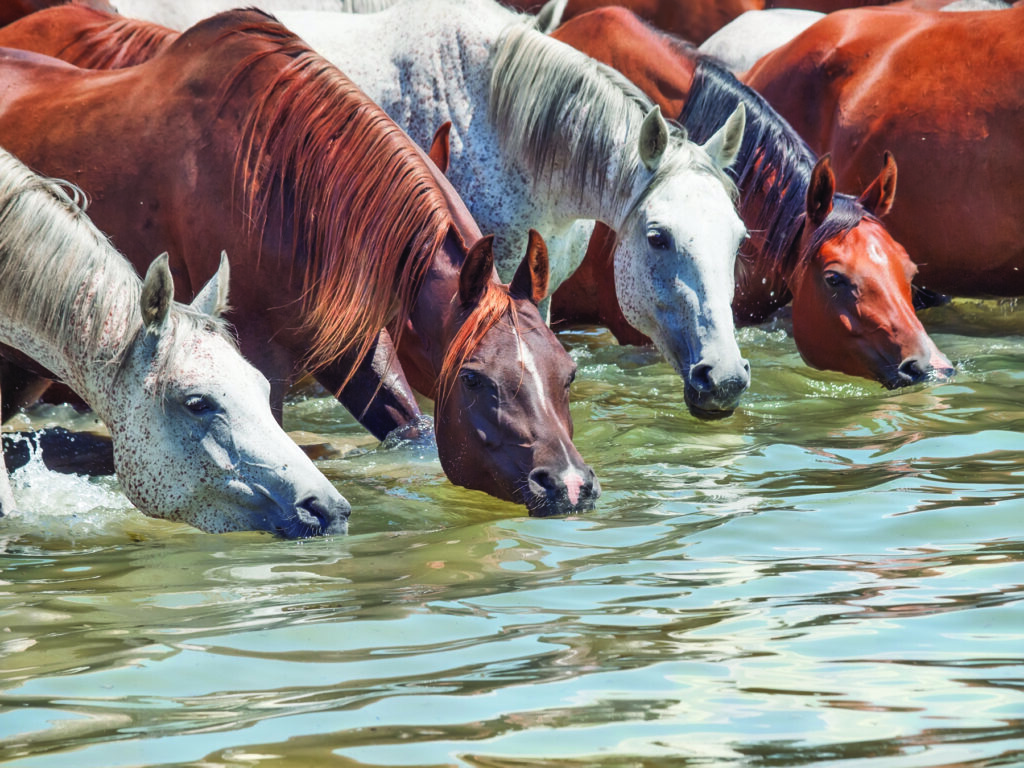
Many horse owners in the foothills communities, along the Front Range, and even throughout the State of Colorado give no thought about the legality of the source of water for their horses. Whether it be a “frost free” spigot, a garden hose running from the house, or plumbed automatic waterers, people turn on the tap to water their horses.
However, Colorado Water Commissioner Tim Buckley explains that it is important for owners to understand the legal issues relating to sources of water and its availability for their horses and/or livestock.
According to Buckley, all waters in the state of Colorado are owned by the people of Colorado. The right to use the water or a “water right” is the right to divert or use the water under the prior appropriation system as long as the water is put to a beneficial use. The “State” or Departments of the State, such as Colorado Parks and Wildlife and others, own water rights, but are not any different than a private water right holder. The function of the Division of Water Resources is to administer these rights.
Even rain water collected in buckets and barrels or puddles in the pasture is not necessarily available for a landowner’s use. Actually, unless a property owner has specific legal rights to use rain water, surface water (puddles, ponds or streams), or even their well water for a specific purpose, they are compelled to leave the water where it is.
If you have ever purchased a property served by a well, hopefully your real estate agent discussed the category of that well and its legal uses. Common categories are Household, Domestic, and Livestock. The names of these categories confuse most everyone. After all, wouldn’t Domestic mean inside the house?
Actually, with multiple noted exceptions, Household is for use only inside the house. No exterior watering of plants, animals or even washing your car in the driveway. If you fill up Benji’s bowl, do it from the kitchen sink, not the outside spigot. In certain cases, a Household well could be augmented (a water court process) to allow for a limited watering of a determined number of horses, or an outside garden or hot tub—but the parameters of use will be very clearly defined.
Domestic wells are more likely to allow for the watering of an outdoor animal like a horse. However, “Domestic” does not indicate a blanket permission either. It is important to read the well permit directly, looking for keywords or phrases. Never assume that a Domestic well category gives you the freedom you are looking for. For example, most Domestic wells would not allow for you to board outside horses on your property for profit. In this case, the well permit will say something like, “for the watering of non-commercial livestock.” In the case of horse boarding businesses, a Commercial well status is a common requirement.
“How do you find out if your current source of water legally allows you to water your horse?”
Another category we see on older farm or ranch use properties can be “Livestock.” This category gives broader permissions and allows a wider variety of uses. Cows, horses, goats, etc., can be allowed to be watered from these types of wells. That said, read the permit itself for limitations or further definition.
What about your pond or the creek that runs seasonally or even year-round through the back forty? The answer may surprise you. Without an adjudicated (again—water court process) water right to use the water out of that pond or creek or ditch, it is not a legal source for watering your horse. To my knowledge, the State of Colorado does not currently require you to keep your animal away with a fence or other barrier, but a stern talking to your animal along the lines of “don’t drink that water” is in order, and that water cannot function as the animal’s primary water source.
How do you find out if your current source of water legally allows you to water your horse? There are several options available to you. Hopefully you received a copy of your well permit during the Due Diligence period when you purchased your property (or when the well was drilled if you bought vacant land). Pull it out and read it over, looking for the “type” description. You can also find out your well information through the Colorado Division of Water Resources. Their website has an easy search tool by owner, address or parcel ID. You can also contact them via phone or their contact form. The people there are very helpful and are happy to give you the information you need.
What if you learn that Big Red can’t legally drink the water from your well? Commissioner Buckley offered more than one solution for that situation as well. The more expensive alternative is to add a water right to your well through a Water Court process. This involves available water rights for your watershed, a water attorney, and a willing seller of the water right. A quicker and more inexpensive alternative would be to install a cistern at your property and to purchase potable water from a local vendor. Keeping a record of your purchase history and the number of horses you are watering keeps you on the up and up.
Looking to buy a horse property and wanting to conduct the proper due diligence to ensure that a legal water source for your horse is included? Seek out an experienced real estate agent who specializes in horse properties, farms and ranches. They can guide you through the process. It is also recommended to hire a water attorney to conduct a title search to verify any adjudicated water rights, especially in cases where more than a well permit is being transferred. It will cost you money up front, but the peace of mind it brings will justify the investment.
Want to learn more? Visit the Division’s website at dwr.colorado.gov or call them at 720.791.8005. Legal water use is a big deal for residents of Colorado. Get informed and don’t be surprised down the road by the legal use of your well for your herd!
Heather McWilliams © 2024.

